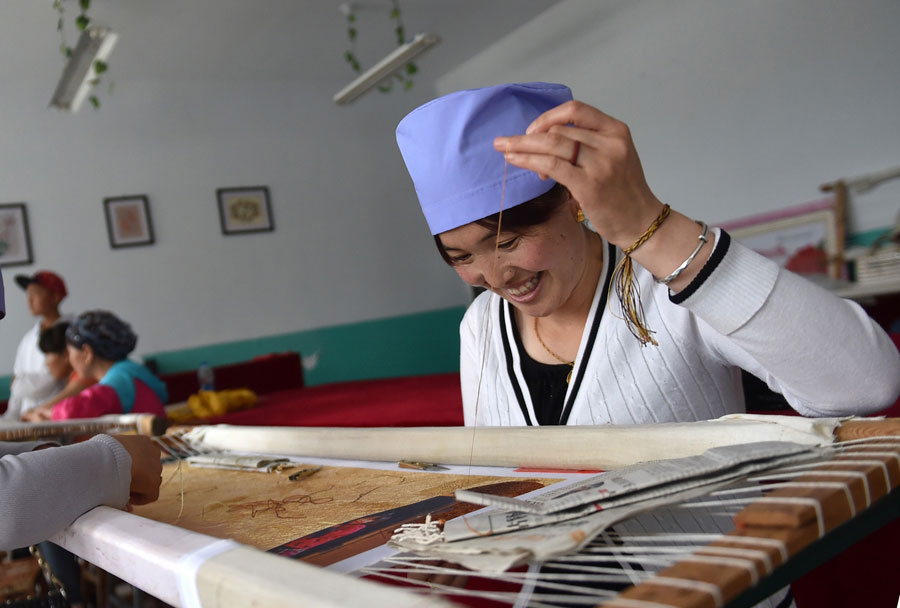Seamstress tailors embroidery business
China Daily | Updated: 2019-04-04 08:56

Limited market size and fierce competition led her to take her crafts to bigger markets outside her county
In a small workshop in Northwest China's Ningxia Hui autonomous region, Li Youxia turns threads of finely matched colors into blooming peonies on a piece of cloth.
Li is a seamstress skilled in ethnic Hui embroidery. The art is rich in color with a delicate texture, and is characterized by the unique culture of Hui people.
The 41-year-old seamstress will take her latest works to countries along the Silk Road Economic Belt this month, hoping to attract orders for her embroidery overseas.
"Kuwait will be my first stop, and I will probably get an order there," Li said. Last year, a Kuwaiti businessman had seen her embroidery and discussed doing business with her.
The county - home to a large Hui population - is famous for Hui embroidery. Most local women can embroider, as part of their family tradition.
Li watched her mother and grandmother weave threads on pillowcases and shoes when she was a little girl, and learned it by heart.
"I went to work for a while, but I still stuck with embroidering," she said. "In 2006, I resigned and opened my own workshop."
The beautiful embroidered flowers on cloth later translated into big business, and Li even launched her own company in 2010.
"Local people in Haiyuan are quite fond of the embroidery, but the market was limited, and competition was fierce," she said. "So, I started thinking about taking my products to a bigger market in China."
Li began attending exhibitions across the country, and many foreign business people showed particular interest in her works. It was during this period that Li's ambition turned from "going to other provinces" to "going overseas".
In 2010, she went to Saudi Arabia, Turkey and Egypt to see if there were any business prospects. Even though there were no deals struck, she saw huge potential.
"People in these countries were quite interested in handmade Chinese souvenirs, but our products failed to meet their expectations due to strong cultural differences," Li said. Hence, she decided to transform her business by accepting tailor-made Hui embroidery.
She also started building connections with foreign businesspeople at the China-Arab States Expo, which is held every two years in Yinchuan, the regional capital of Ningxia. As a start, she managed to establish connections with Malaysian and Indonesian customers.
With the rising number of countries and regions participating in the Belt and Road Initiative, the market for Hui embroidery has also expanded. Over the years, Li has visited more than 10 countries in Southeast Asia and West Asia.
The products Li makes include wallets, scarves, shoes and artwork. She also produces art collections for high-end consumers. Last year, she inked deals worth about 3 million yuan with a Malaysian businessman.
"I started from scratch, and it was difficult," she said. "But the government supports the development of Hui embroidery, and I am also experienced, so I want to go further in the business."
Li's company currently employs more than 30 seamstresses, including eight "intangible cultural heritage inheritors" at the city or county level.
"We used to be 'little women' spending our days around woks, but now we are independent women making money from the work we love," she said. The monthly salary of each seamstress can reach 6,000 yuan ($894) - a handsome income in the poverty-stricken county.
"They trust me and stick with me, and of course I want to help them make more money to live better lives," Li said.
Officials in the county have also encouraged locals to jump on the bandwagon of the Hui embroidery business.
In 2015, a startup training base was established in Haiyuan, helping women in poverty improve their skills in embroidery and paper-cutting, also a local tradition.
Li Jinxing, a local official, said the base has turned out more than 4,200 professionals in embroidery and paper-cutting.
"The embroidery and paper-cutting industries in 24 villages can create annual revenue of more than 16 million yuan," the official said.
Li Youxia said that when production in her company is in full swing, she goes to seek skilled women from the training base for help.
"I hope to boost the confidence of women in our county, while passing on our cultural heritage," she said.
Xinhua
























